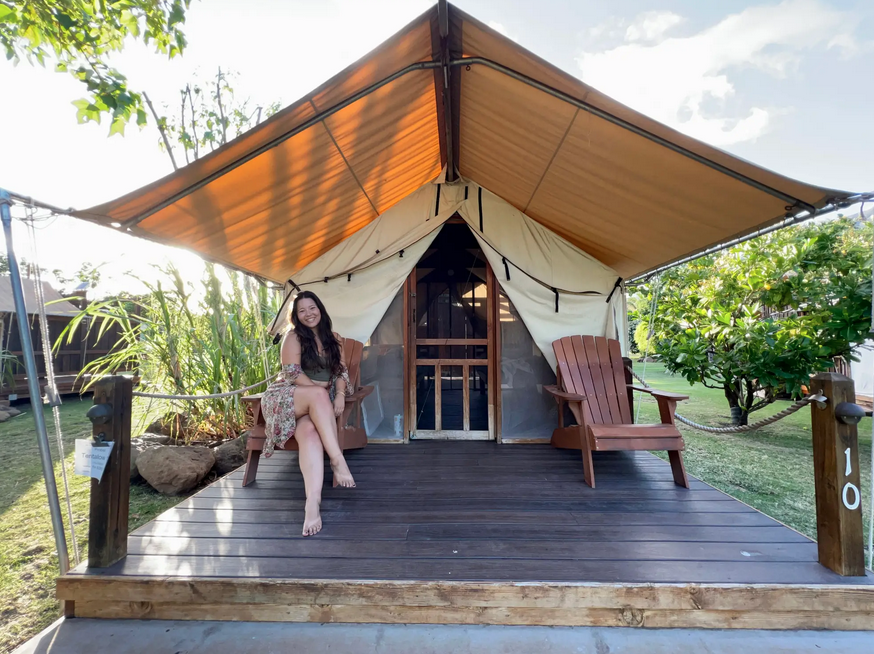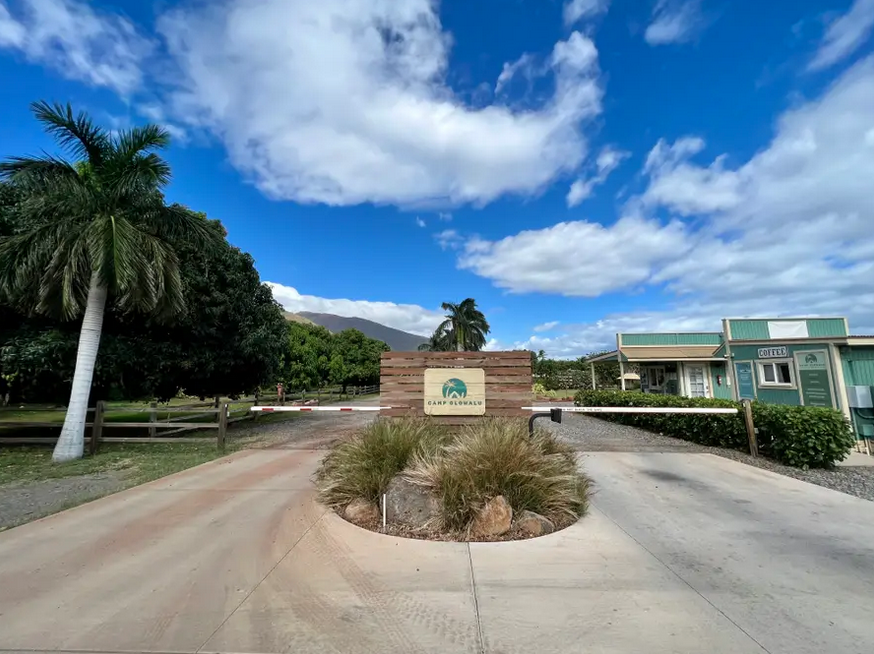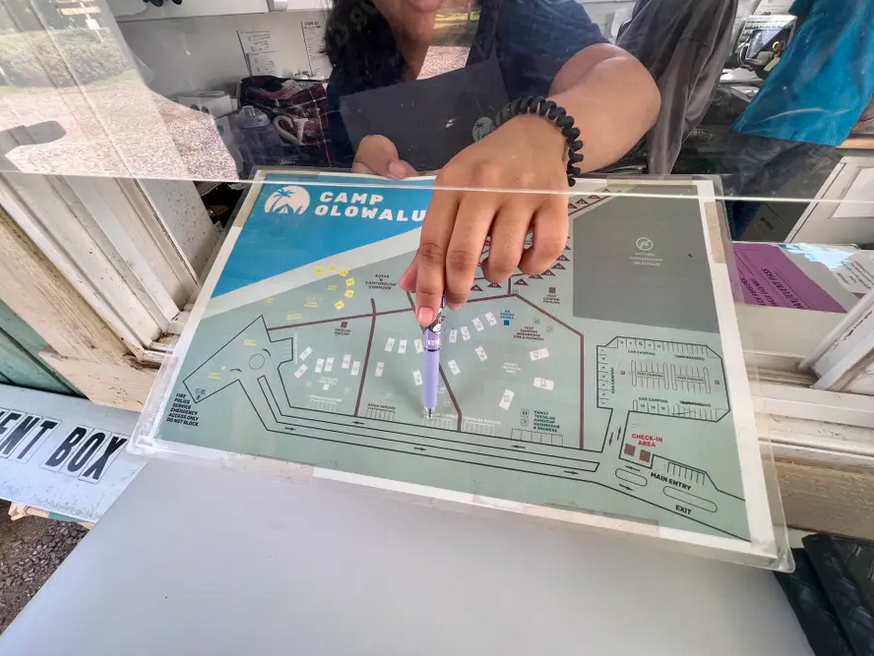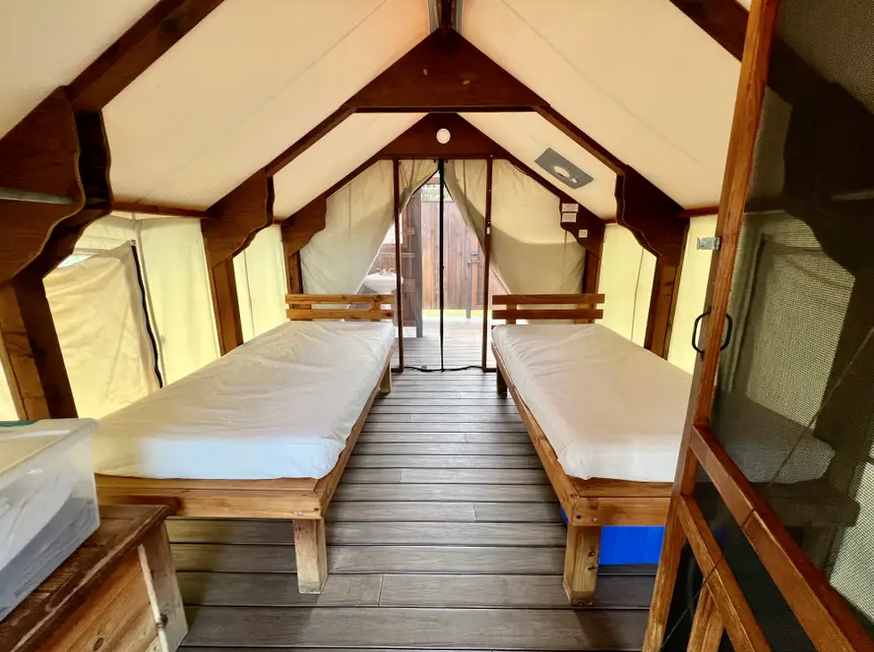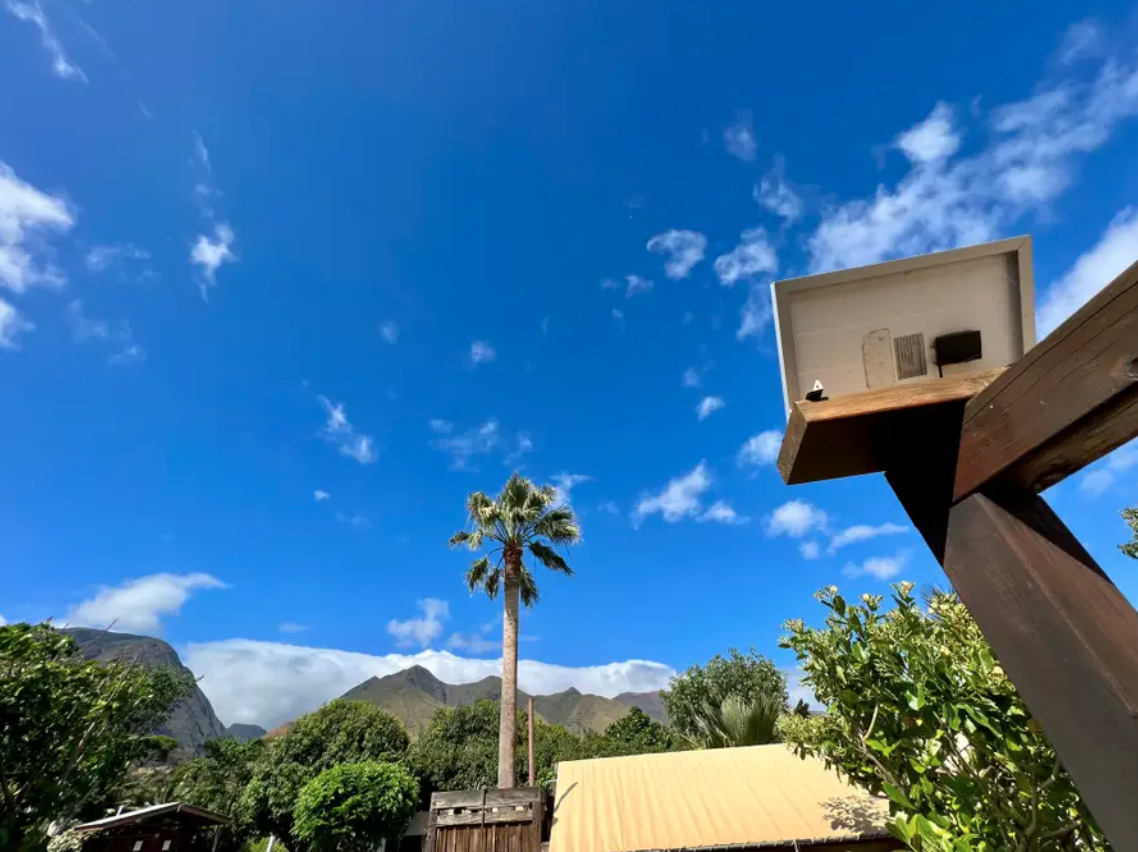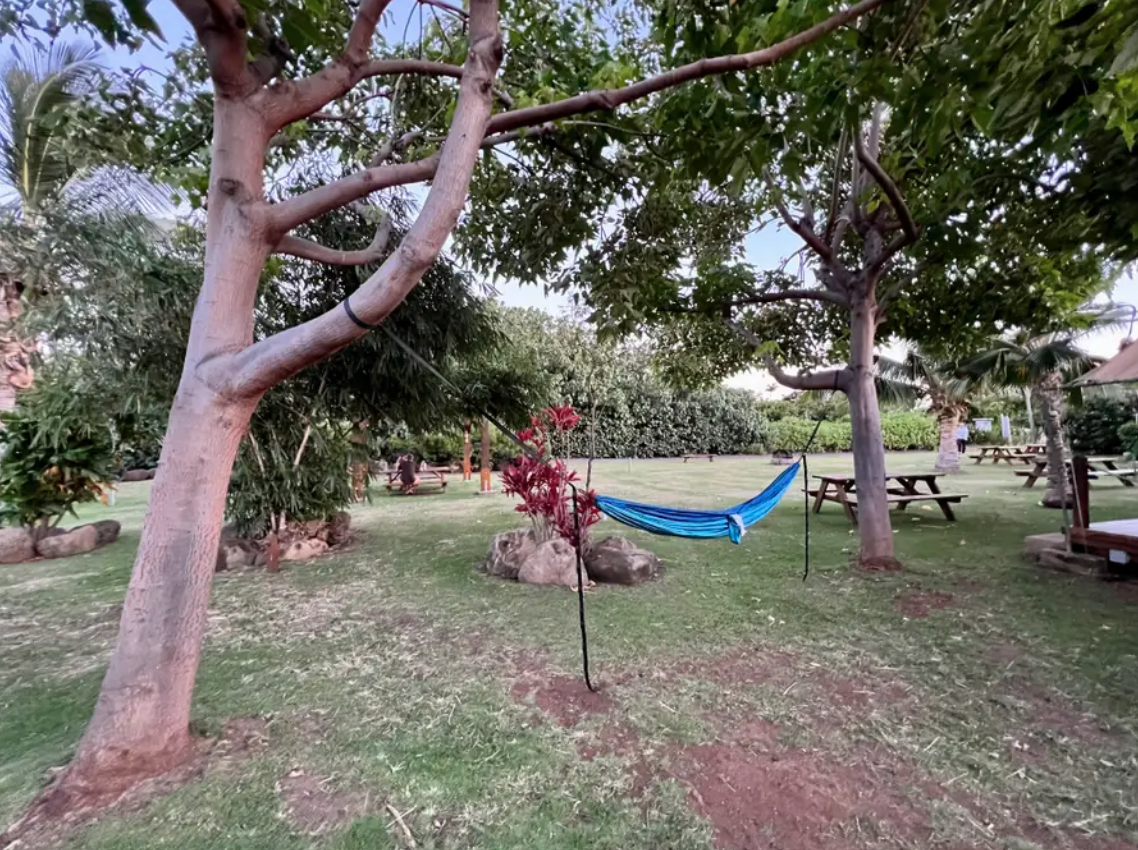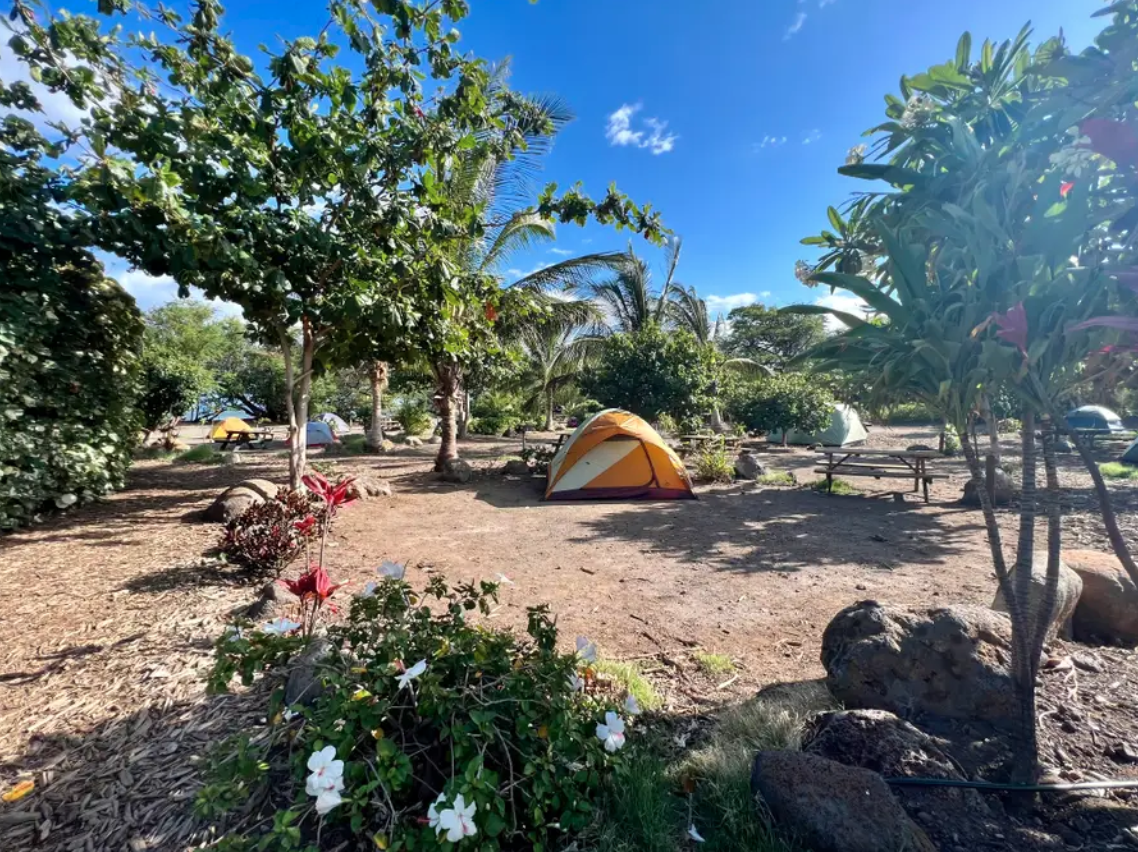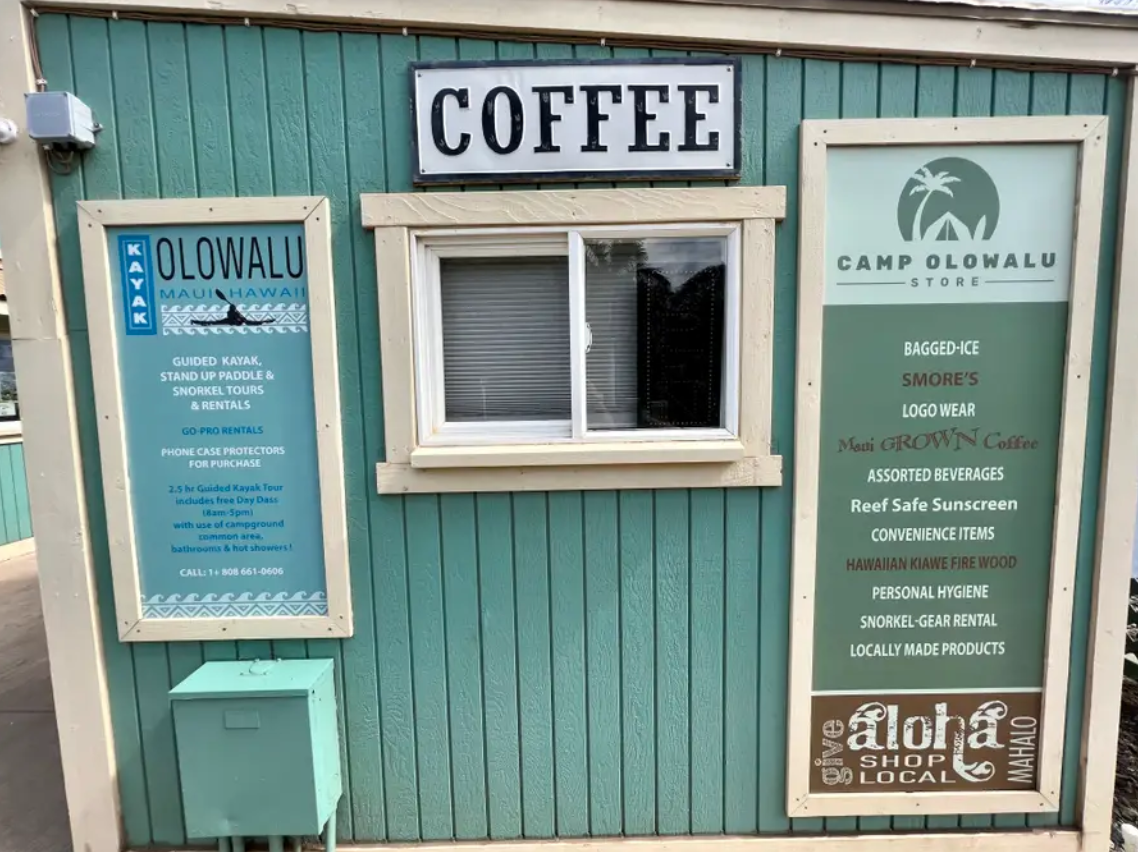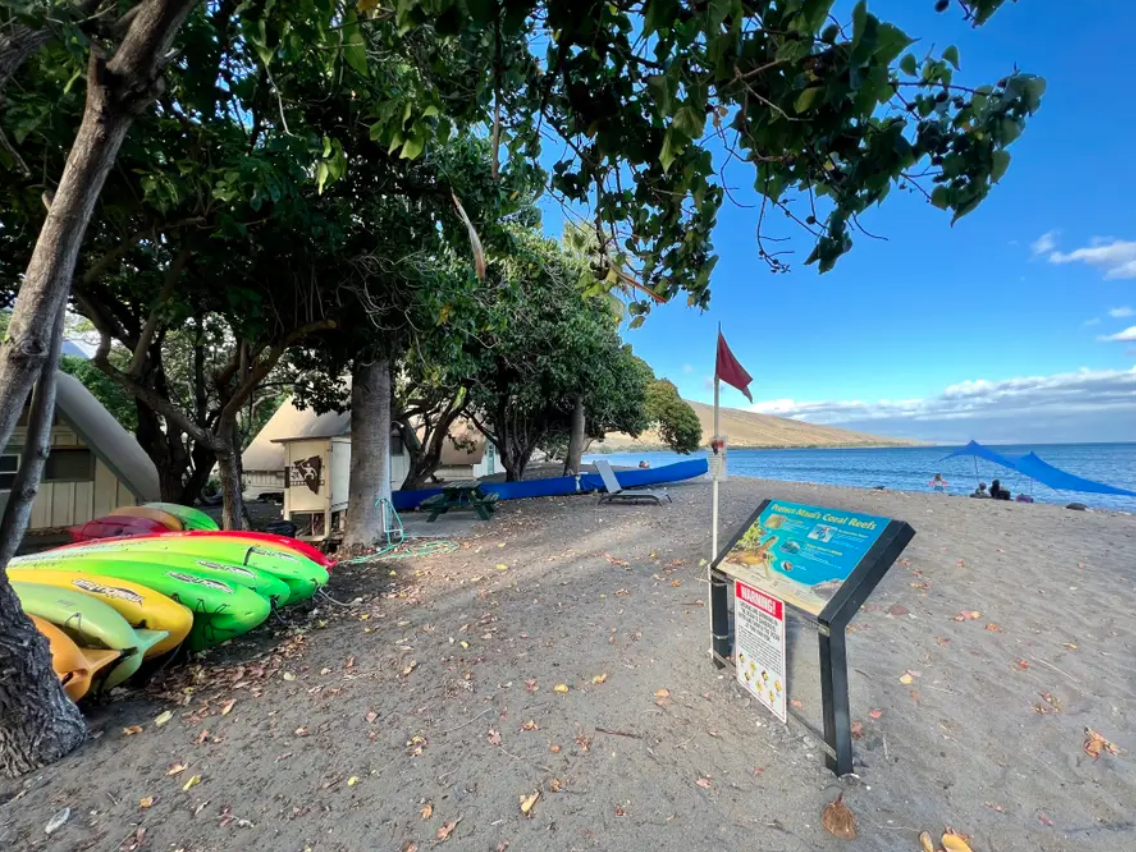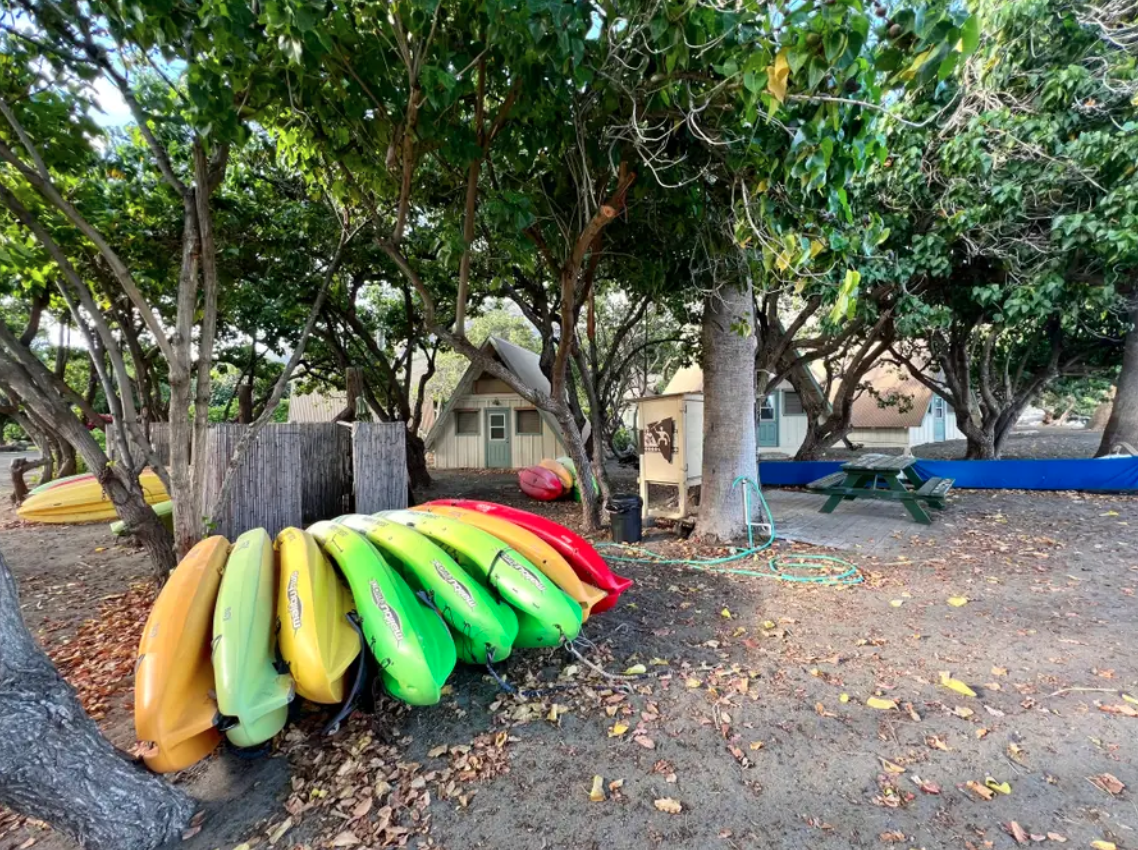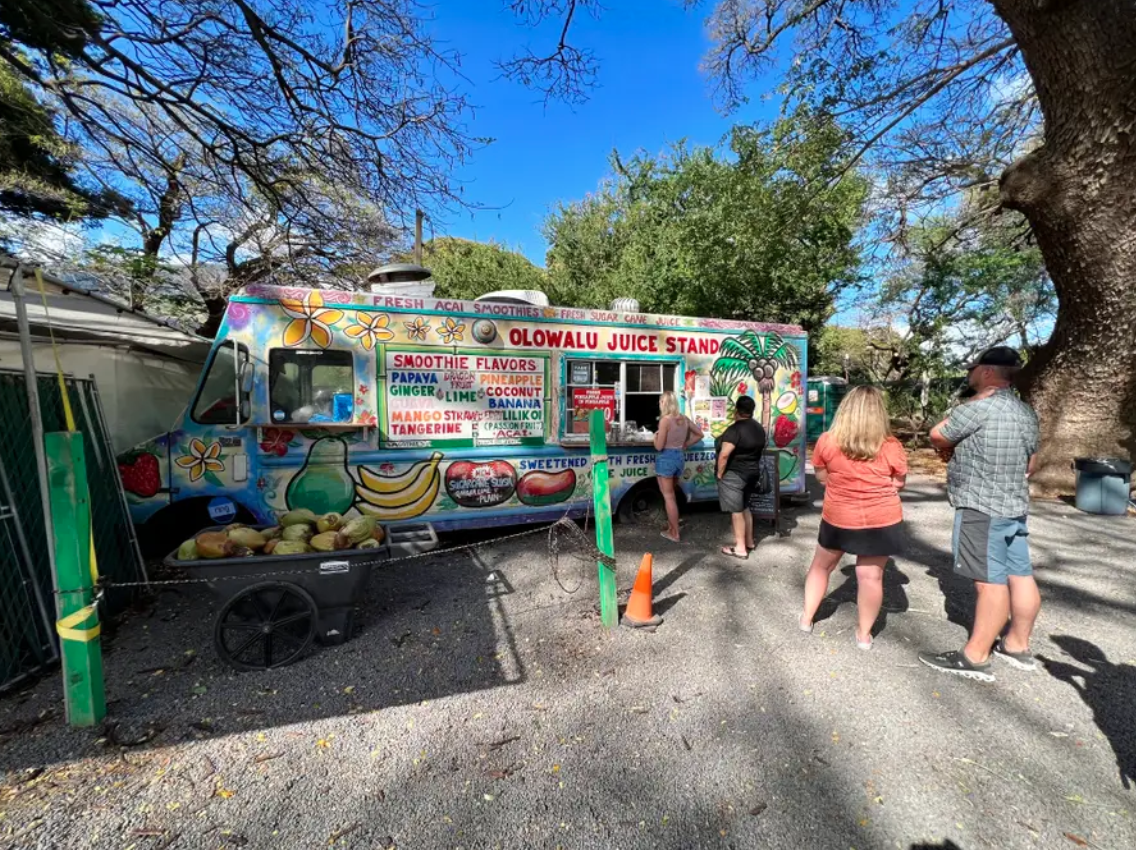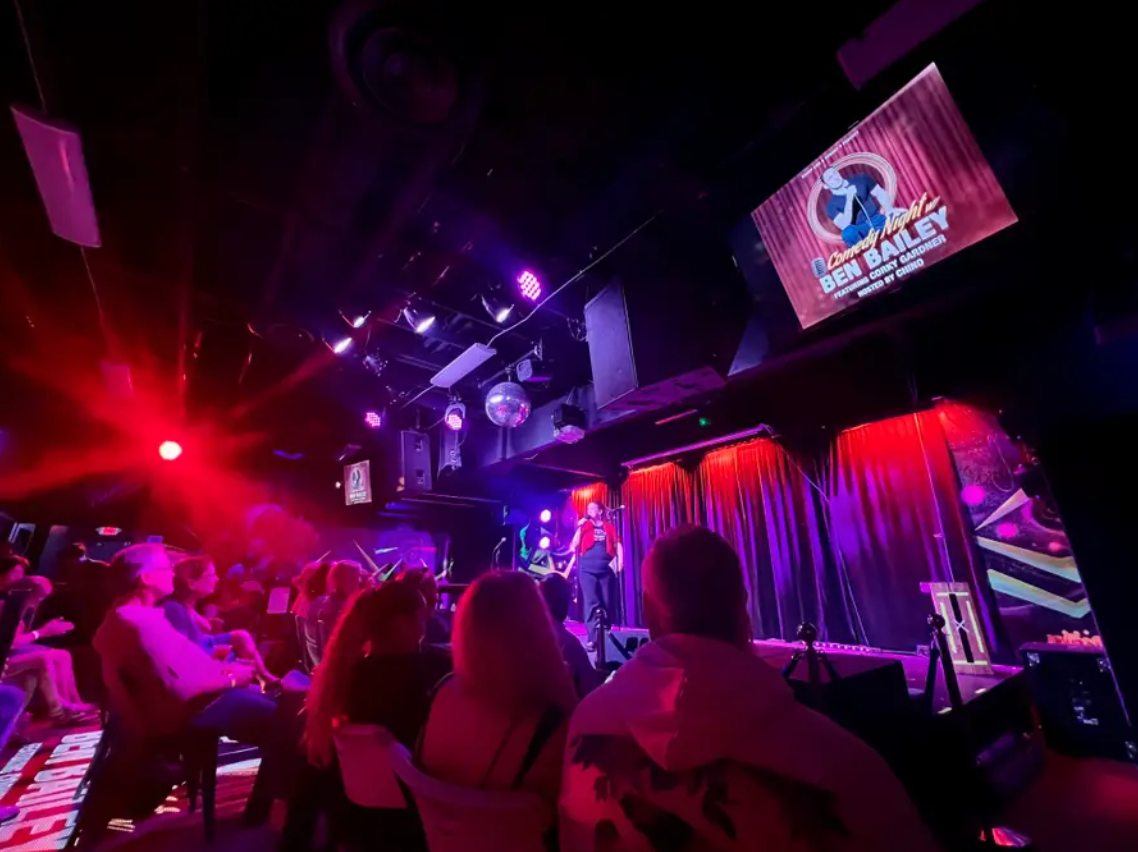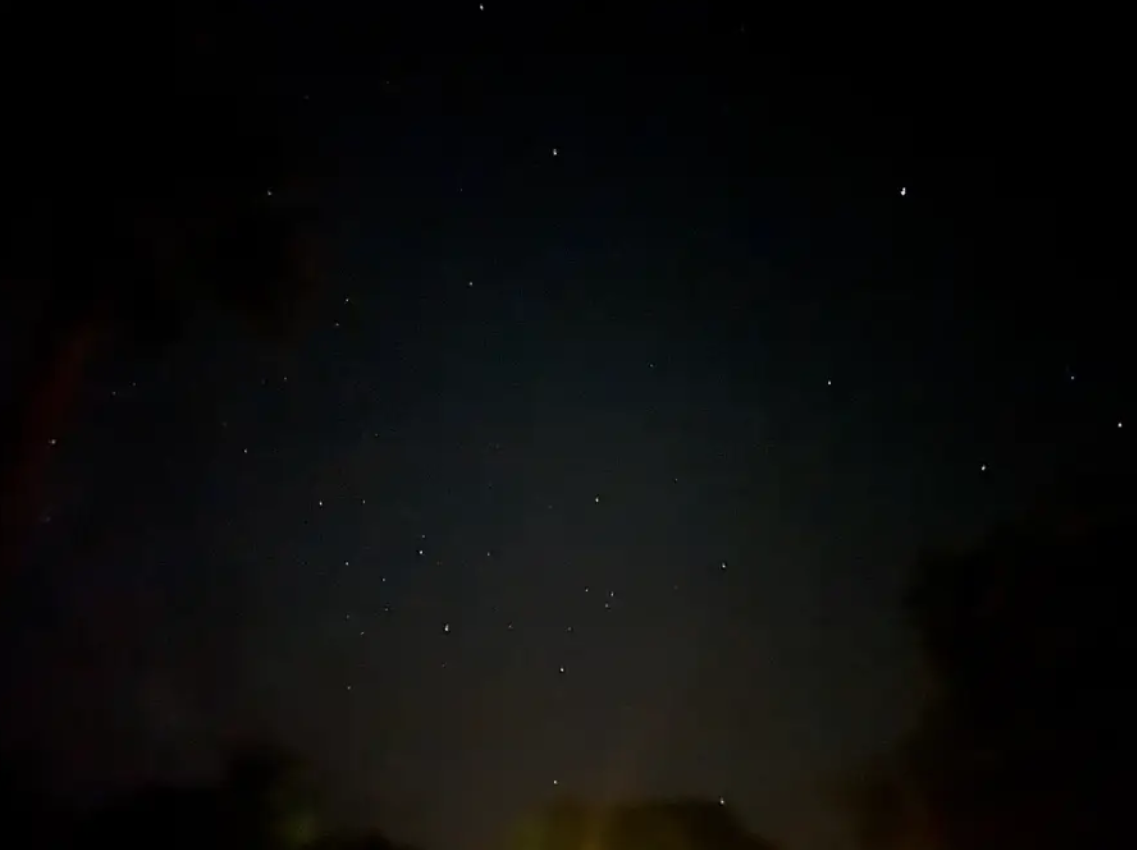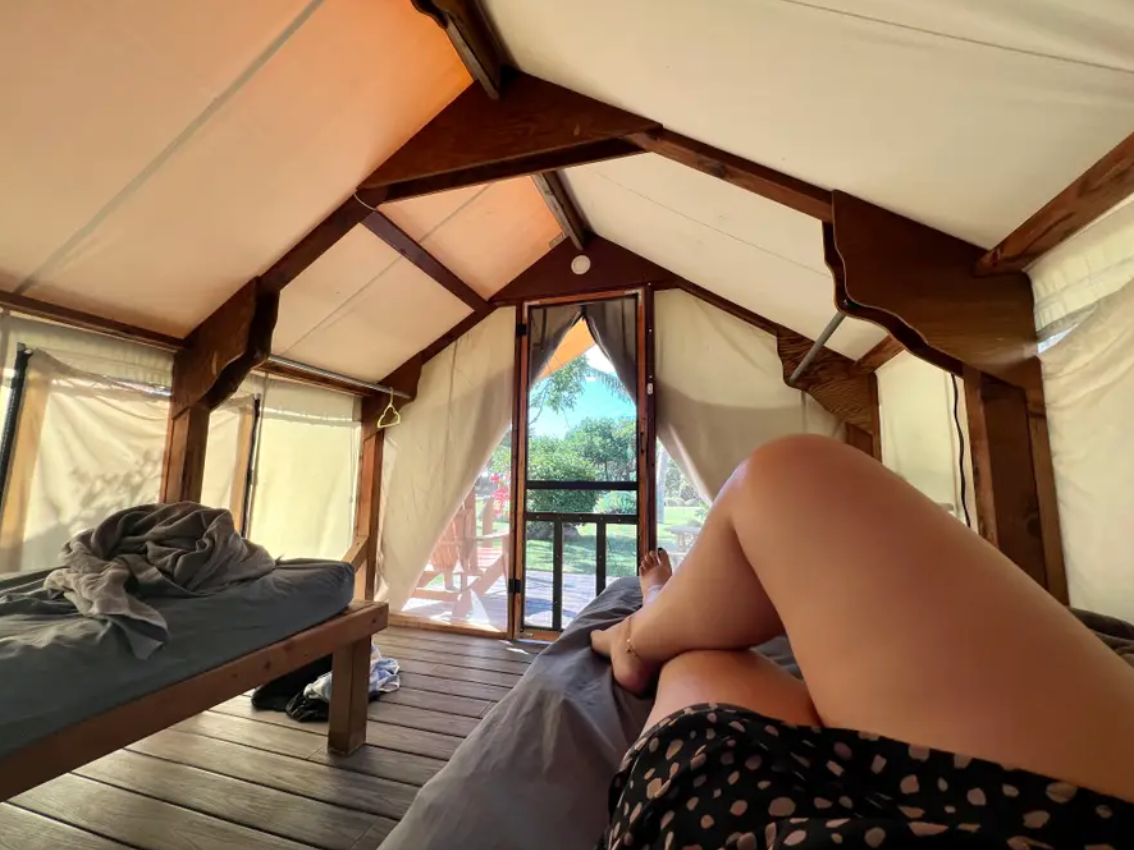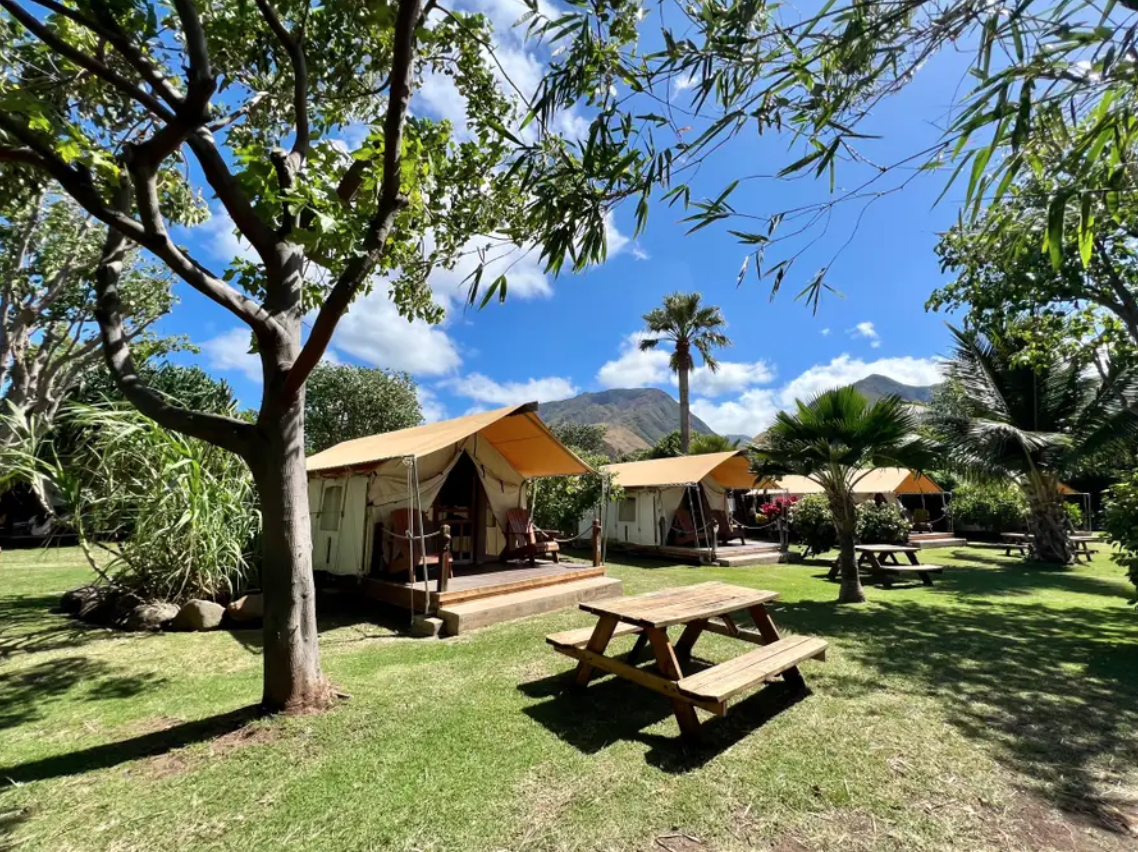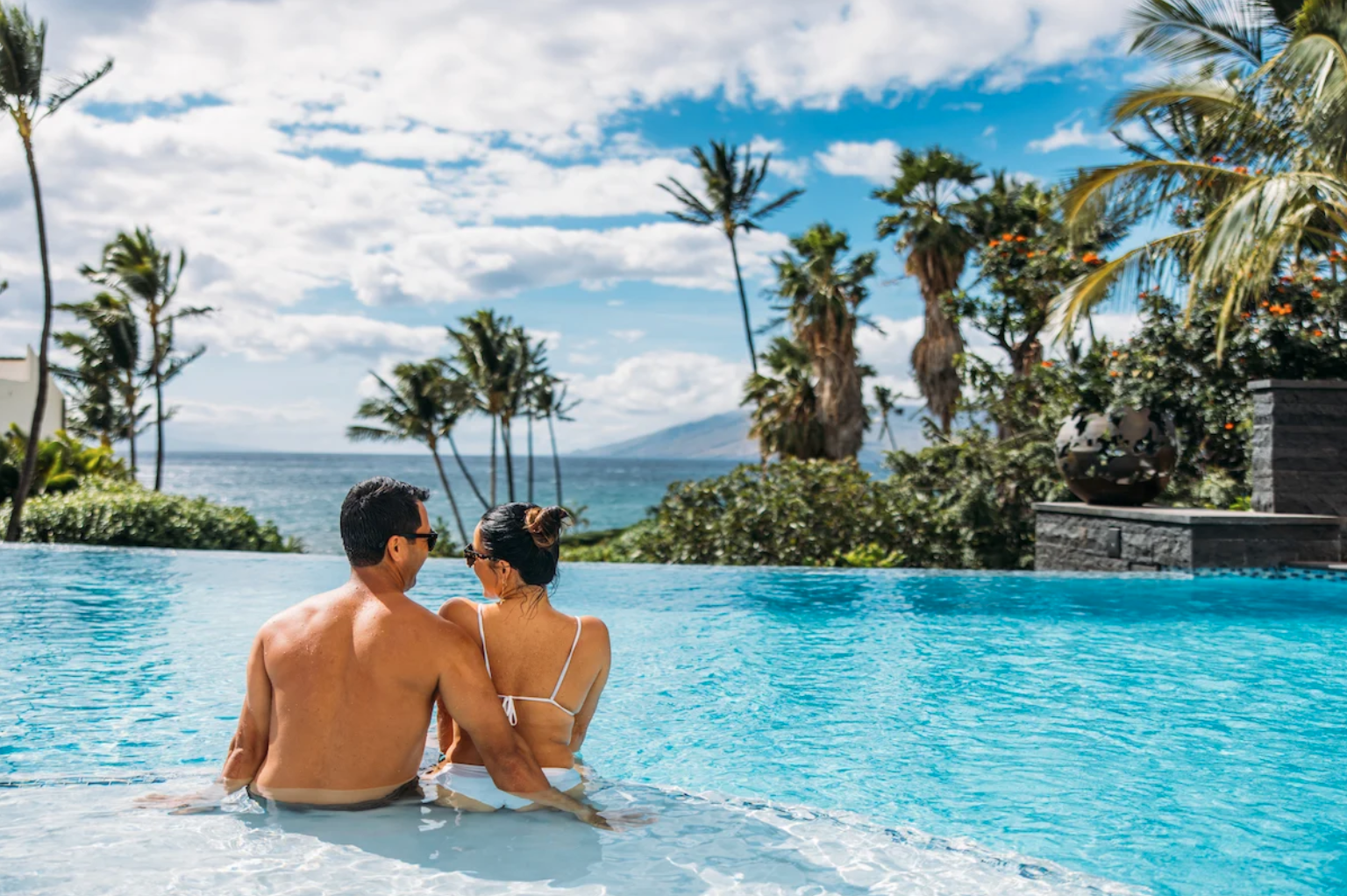I paid $150 to sleep in a 260-square-foot 'tentalow' on a Hawaiian beach. Next time, I'll return with a bigger group
I recently went glamping in a 260-square-foot "tentalow" at Camp Olowalu in Hawaii for $150.
I got an oceanfront space with an alfresco shower and access to a toilet with running water.
It was a stress-free stay and I'd like to return — I just wish it was located on a better beach.
As a seasoned explorer of unconventional accommodations — such as a converted horse trailer and questionable camper van — I was eager to try going glamping in a "tentalow," a tent and bungalow hybrid.
For my glamping trip I visited Camp Olowalu on the island of Maui. The campground was established in 1955, though it's undergone many changes over the years. Today it offers an array of lodgings at various price points, from car or tent camping for $30 a night to a collective of six cabins for $1,650 a night.
Here's what it was like to stay in the 260-square-foot space, and why I'm thinking about returning with more friends next time.
I opted for a tentalow because it was affordable and also offered access to modern amenities like an alfresco shower and flush toilet.
There are 21 tentalows at Camp Olowalu.
The tentalows are outfitted with two twin beds, which make for more comfortable sleeping arrangements than traditional tent camping. With space for two guests, bringing a friend to split the cost can bring the cost down to $75 a night before taxes and other fees.
Though tent or car camping is significantly cheaper, it lacks certain amenities — namely running water. Glamping is an amalgamation of simplicity and luxury.
By opting for a raised-platform tentalow, I got to be immersed in nature with fewer mosquito bites, which is worth the price tag for me. Plus, I just can't resist private outdoor bathing areas.
The check-in process was easy and took less than five minutes.
An employee provided directions to our tentalow from the check-in kiosk.
Upon arrival, my friend and I parked in a 10-minute spot designated for guests who were checking in. We only needed about half that time, as the check-in process took less than five minutes to complete.
Single and family tentalows are both available to rent and can sleep two and four adults, respectively, plus a maximum of two kids. Our tentalow was meant for two adults.
I got a partial refund for being a local and volunteering in the area.
I checked in at a kiosk near the entrance to Camp Olowalu.
I was able to apply two discounts to my bill: 10% off for being kamaʻāina (a Hawaii resident) and 10% off for volunteering with Kipuka Olowalu through Mālama Hawaii. An employee told me that these are the only two discounts that can be stacked.
Since I had already prepaid online, $35.22 was refunded to the card that the office had on file.
The tentalow had enough space and amenities for two people.
The front of the tentalow featured a raised-platform deck with Adirondack chairs.
In front of the tentalow was a picnic bench, two Adirondack chairs on either side of the lānai (Hawaiian word for a patio), and a built-in bottle opener on one of the posts.
To access the inside, we input the provided code into a combination lock on the front door. This opened up into the bedroom, which contained two twin beds and storage space like a clothing rack and wooden chest with a small safe.
There was also a cooler hidden under one of the beds. In the back, separated from the bedroom by a mosquito net, was an alfresco half-bath with a shower, sink, mirror, and door that led to the common areas as well as our private toilet.
We had to make our own beds upon arrival.
The two twin beds in the tentalow were not made upon arrival.
Indoor accommodations typically provide beds that are made and ready to sleep in upon guests' arrival. Our bedding and pillows were tucked away in a weatherproof bin, which I assumed was to keep the sheets clean.
It was unconventional to make our own beds, but it was considerably more luxurious than sleeping on the ground as is common in traditional tent camping.
The alfresco half-bath was my favorite part of the experience.
The outdoor shower provided hot water.
Showering in the open air was refreshing, especially thanks to the heated water system. I enjoyed two showers, one in the evening after arrival and another in the morning before checking out.
The interior lights were solar-powered and only worked at night.
Solar panels were installed on the outside of the tentalow.
I always love eco-friendly elements, so I was pleased to see solar panels installed on the outside of the tentalow. These powered the interior photocell lights, which could only be turned on between sunset and sunrise.
Despite having solar-powered electricity, we didn't find any outlets available to charge our electronics. I wondered if this was intentional to encourage campers to unplug during their stay.
We shared a toilet with one other tentalow.
The space seemed pretty clean.
The shared half-bath was also open-air and included a flush toilet, sink, and mirror.
There were two trees near the tentalow that were the perfect distance apart for hanging a hammock.
My friend hung their hammock in front of our tentalow.
Since the tentalow on our right was unoccupied, we hung up a hammock on the trees outside our units. Admittedly, I'm not sure if this was technically allowed but no one asked us to take it down and it was there for the majority of our stay.
We did a self-guided tour of the grounds to check out the common areas and other campsites.
The tent camping spots were basic, especially compared to the tentalows.
My friend had stayed in the tent camping area before, so they took me on a brief tour of the grounds to show me the common spaces.
Camp Olowalu is one of the only places in the state that offers designated car camping spaces. Trash and recycling were located in one of the common areas and there were public restrooms available for those in car or tent camping spots.
The public showers and toilets looked well-maintained, but I was still grateful to have a more private bathroom.
We came across an on-site store where campers could purchase supplies and refreshments.
The Camp Olowalu Store is open from 7:45 a.m. to 6 p.m.
An adjacent kiosk housed the Camp Olowalu Store. Here, campers could purchase the likes of bagged ice, s'mores kits, kiawe firewood, Maui-grown coffee, reef-safe sunscreen, and other locally made products.
The beach was easily accessible, but it's not my favorite spot on the island.
Maui's largest reef is steps away from Camp Olowalu.
Olowalu is home to Maui's largest reef, which spans nearly 1,000 acres. This makes for excellent snorkeling, but this isn't an ideal spot for swimming during low tide. I went to the beach for golden hour and sunset but didn't get in the water.
In my opinion, it also may not be in the island's best interest to give tourists easy access to this vital ecosystem.
Those who are uneducated and choose to ignore signage at the beach's entrance may unknowingly harm the reef by using sunscreen with toxic ingredients, stepping on or touching the coral, leaving behind litter, and other common mistakes I've seen visitors make.
Guests can also book a kayak or snorkel experience at Olowalu Beach.
Watersports equipment like kayaks are available for tours and rentals.
Kayak Olowalu hosts guided kayak, snorkel, and stand-up paddleboard tours and also facilitates equipment rentals for these aquatic activities.
The 2-1/2-hour kayak tour also comes with a day pass that grants access to the campground's common areas, bathrooms, and showers. Go-Pro rentals are also available to capture these adventures.
We walked across the highway to see what food options were available for dinner.
The Olowalu Juice Stand sells smoothies and sugar-cane juice.
There is a limited number of eateries in Olowalu. Just across the road, though, we found a general store and a local farmers market that's open every day from 8 a.m. to 5 p.m.
We also saw a pair of food trucks selling pizza and sweet treats, a juice stand, a general store, and Leoda's Kitchen and Pie Shop. Leoda's sells sandwiches and homemade pies and it's my personal favorite.
Par for the course with this unconventional camping trip, we went to a comedy show at a live entertainment venue down the road.
Comedian Ben Bailey performed a stand-up show at Da Playground in Māʻalaea.
A mere 15 minutes away from Camp Olowalu is Māʻalaea, a small town on Maui that is home to activities like the Maui Golf & Sports Park for mini golf, bumper boats, rock climbing, and other family-friendly activities; the Maui Ocean Center aquarium; retail stores and restaurants at the Maui Harbor Shops; and Da Playground, a live-event venue that hosts the likes of concerts, dance parties, and comedy shows.
We went to Da Playground to see comedian Ben Bailey from the "Cash Cab" game show do a stand-up show that was prefaced by other local comics.
When we returned to camp after the comedy show, we enjoyed stargazing from the hammock.
Stars light up the night sky in Hawaii.
Stargazing is a must when camping in Hawaii, so we made a point to fit this mellow activity in before turning in for the evening.
With minimal light pollution, a star-studded sky is one of the many natural wonders that Hawaii has to offer — and the Milky Way is visible on clear nights. Campers would be remiss not to look up and enjoy the view.
The next morning, we discovered that the tentalow heats up quickly.
We opened up the tentalow first thing in the morning because it was so hot inside.
Before going to sleep, we closed the tent flaps for privacy. We learned the next morning that the temperature inside the tentalow rapidly rose as soon as the sun came out.
The heat woke us up and we opened the tent back up for better airflow.
We checked out of the tentalow at 10 a.m.
We took out our trash before checking out of the tentalow.
After spending some time on the lānai in the morning sun, I took advantage of the outdoor shower one more time before checking out at 10 a.m.
Per the campground rules, we packed out our trash and disposed of it in the common-area garbage cans before departing.
Next time, I want to go with a larger group and rent out the cabins.
Next time, I'd like to host a spiritual retreat at the Camp Olowalu cabins.
After my stay in Camp Olowalu's tentalows, I was pleased with the affordability and mountainous vistas but left wishing it was located at a better beach that isn't as susceptible to damage by uneducated tourists.
Still, overall, I had a wonderful experience glamping and feel the stay is worth the price when split with a friend. I'd like to return to the campgrounds with a group big enough to rent out the six A-frame oceanfront cabins, which must all be rented together.
Although they're significantly more expensive upfront — $1,650 a night for a minimum of two nights — these lodgings can accommodate up to 36 people. At maximum capacity, this would cost less than $100 per person for two nights before taxes.
The cabin rental also comes with access to a 900-square-foot mess hall and fully equipped kitchen, a designated parking area, outdoor grills, and coin-operated laundry. My vision is to host a spiritual retreat here with friends, business collaborators, and clients.

